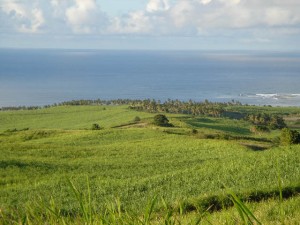VIEWPOINT by Xenophon – The National Patrimony
Land … how wonderful it is to own land. How sweet it is to the human soul to be the owner of property. Owning property imparts a sense of security, of wealth, of worth. Culturally, the peoples of the former British – now Commonwealth – Caribbean are a land-hungry people. The drive to own land has roots deep in our slave-feudal history, when plantation owners denied their former slaves the privilege of owning land in a time when land ownership was the very definition of free citizenship, and the passport to suffrage.
In the years following the end of formal slavery, gratified plantation owners gloated that they were free from high operating costs that accompanied even the responsibility to barely house, clothe, feed and care for large numbers of brutally exploited slave property. Now, the “freed” slaves were no longer a burden; they could take care of themselves. The catch was that the restrictions on land ownership denied them to ability to produce their own food and cash crops. This forced the freedmen back onto the plantations, where they labored to produce even more for the landowners at wages that bitterly mocked the word “freedom”.

This history explains why the ownership of land became such an essential feature of our local culture, the dream of every descendant of African slaves. Time passed, and the labor unions brought political power and real liberation to the land-hungry peasants. The land-ownership qualification for voting rights disappeared, and universal adult suffrage became the order of the day. Culturally and economically however, nothing could replace the allure of owning land in the heart and mind of the struggling laborers and peasantry. It was therefore only natural that when the decline of the sugar industry forced bankrupt plantations and syndicates to liquidate their assets, the labor-based St Kitts-Nevis Governments of Premier Robert Llewellyn Bradshaw stepped in to secure the sugar lands on behalf of the people.
Having paid a hefty price for the privilege of owning their lands, many people bitterly reject the concept of using the national patrimony (the land) in a manner that threatens to remove it from the state’s control. To some, the mere ownership of the lands by the state is sufficient to provide a sense of national wealth and economic security. In their view, if the government is to use the national patrimony at all, its primary use should be to provide housing for the people and a way for individuals to pursue their own personal economic advantage.
This attitude, based mainly on emotion, ignores the imperative to exploit the national patrimony in a way that attracts capital investment from outside the naturally limited local economy, in a way that benefits the population at large. This debate currently animates the Federation of St Kitts & Nevis, as the Government, the Sugar Industry Diversification Fund and the National Bank continue moving the national economy to new heights. Prime Minister Dr Denzil Douglas and his Labour government have launched the Federation on a visionary path toward greater national development, leveraging the national patrimony in pursuit of that quest.
Though shortsighted pessimists originally attempted to stand in the path of progress, even the Nevis Island Administration has now decided that Prime Minister Douglas and his Cabinet were right indeed – and now they too, like St Kitts, will be using their land to reduce their debt and to move their people forward.
